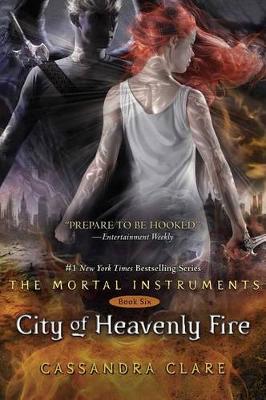Reviewed by girlinthepages on
Firstly and fore-mostly, it’s important to mention that CoHF is the book where Clare really ties all of the threads from all three of her series together (The Mortal Instruments, The Infernal Devices, and The Dark Artifices). Readers are introduced to Shadowhunter families that had been mentioned in other generations, such as the Blackthorns and the Carstairs, and the conflicts among and between the Shadowhunters themselves and between Nephilim and demons are cross-generational, and if you’ve read Clare’s other series it all comes together beautifully.
This is a book about war. There is tragedy, death, and anticipation, and readers will be holding their breath throughout it (in the same way readers held their breath during Harry Potter and the Deathly Hallows, knowing that important characters were going to die). This anxiety-ridden atmosphere leads to an intensity in the investment of the outcome of many of the relationships in the series, and there is resolution one way or another (whether good or bad) for all of the romantic pairings. I was satisfied by Clare’s handling of Jace and Clary’s relationship in particular, and she also introduces another LGTBQ couple and touches upon how members of the Shadowhunter world react to differences in sexuality, which was fascinating. I love that Clare writes her couples as very real, tackling real issues of intimacy, communication, conflict, etc rather than “watering down” the interactions because it’s a young adult audience.
What I love about Clare is that she pulls from a myraid of religious, mythological, and fantasy influences. Readers get to travel between the mundane world, the Fairie realm, Idris, (and for the first time) the demon realms. Religious dogma and influences are drawn from both Eastern and Western traditions, and the possibility of dimensional travel and parallel universes are introduced. There’s also a really fantastic scene in which each characters deepest, selfish desires are realized due to a demon’s influence, and seeing the fallout from that really shows how the characters have grown over the course of the series.
Clare creates an atmosphere in which the toll of death and destruction can not be resolved and soothed solely by victory. The book does not have a clean ending, rather the aftereffects of war are causing problems and tension that will no doubt carry on to The Dark Artifices series. I know there’s been mixed opinions from readers about Clare continuing to write in the Shadowhunter world, but I enjoy reading new narratives within a universe that I’ve come to understand and I believe it will be fascinating to see how (what’s left of) the Shadowhunters rebuild after the devastating war. I think her ambiguous ending with how the Shadow world and everyone within it will move forward is a true reflection of the decades-long rebuilding process that follow wars in the real world.
What I Loved:
A lot of character development! From the Lightwood’s dealing with their grief over the death of Max to Simon’s integration amongst the group to understanding more about Jocelyn’s relationship with Sebastian to learning so much more about Magnus!
There’s very real biases and ideological divisions amongst the Shadowhunters: it’s fascinating to see their prejudices, especially regarding Shadowhunters of “mixed blood” (part Downworlder, part Shadowhunter)
Full integration of story lines/characters from The Infernal Devices and the upcoming Dark Artifices.
A really interesting look at Downworld and Clave politics, and how they oppress and rebel against one another.
Learning more about the Iron Sisters and Silent Brothers.
What Didn’t Impress Me:
The book foll0wed many characters perspectives, with shifts in each chapter. This isn’t necessarily a bad thing, but sometimes I would be anxious to get back to one storyline but then I had to read about one that I didn’t find as interesting (such as about Mia, who has become a third person POV character).
Overall: This book was a really great ending to The Mortal Instruments series, and it came full circle in integrating its prequel series as well as introducing its successor. This book delves deeper than ever into Clave politics, the treatment of Downworlders, and the relationships of characters, as well as exposes the tensions and biases that underlie the Shadowhunter world. There’s a lot of action, a lot of characters that are followed, new realms explored, unexpected betrayal, and deaths to be sure, but the series ends delightfully open-ended to allow the next series by Clare to explore the very realistic fallout from the war and to watch and see how each magical group rebuilds and carries forward. Much as I want to, it’s hard to say anything else without giving away spoilers!
Read more of my reviews at Girl in the Pages
Reading updates
- Started reading
- 4 June, 2014: Finished reading
- 4 June, 2014: Reviewed
